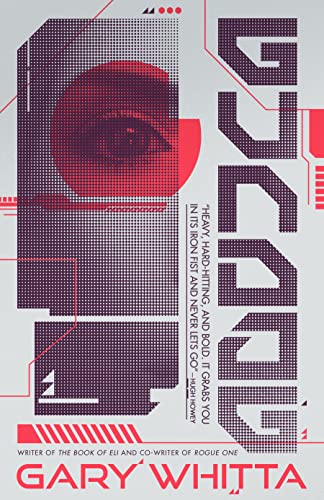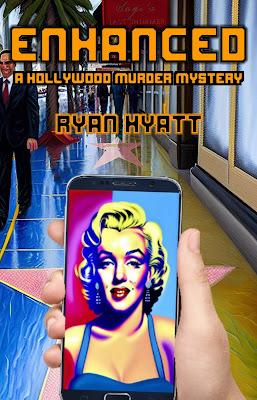Dwain Worrell's Androne wrestles with an American identity as military despot that few Americans care to fully consider. Worrell sets his story in desert wastelands that call to mind the battlefields that the United States has occupied since the beginning of this century—Iraq, Afghanistan, Yemen, Somalia, Pakistan, Syria. Regardless of party politics, the US is continuously at war. Worrell points the finger at ideology, arguing that the US guarantees its own survival by not allowing non-Western ideologies to survive. Of course, it isn't every non-Western ideology that gets run through the grinder of the USAmerican military-industrial complex. Foremost, forever wars have been waged to put terrorism in check and to ensure that US interests are maintained, whether that involves keeping various foreign states from expanding their influence, ensuring that the US controls specific resources, and maintaining a military presence in key regions. The justification for war over the past century has been Woodrow Wilson's WW1 rallying cry to "Make for world safe for democracy," a rallying cry echoed in Joe Biden's assertion that we are in a "battle for democracy."
Gundog: A Review
Gary Whitta's Gundog follows Dakota (why couldn't it have been Yoshimi?!) as she escapes a work prison run by the Mek, a hostile alien race of robots. She follows a cryptic map once tattooed on her brother's now missing arm and also tattooed on the arm of a drifter named Falk that shows up in the prison camp. The robotic Mek don't really have any reason to keep the humans around other than perhaps as some kind of trophy. Whitta doesn't give us much to go on about the Mek, other than that they are cruel, advanced, and in the habit of taking over planets. They are easy to loathe and, really, they are cannon fodder.
Dakota's mother, Rosie, was a Gundog gunner, and a fairly good one, we're told, making her last stand at the Battle of Bismarck and dying with her 'dog. The Gundog is a nod, nearly in name as well, to Gundam Wing. Similar to the wings, the Gundog is a mech piloted by humans with lots of guns (but no dogs).
Dakota follows the map and finds an AI facsimile of Rosie who has created a bigger, badder Gundog. Dakota, along with a diffident engineering genius named Runyon with an eidetic memory train to run the 'dog and then set out on a big 'ole vengeance tour. Dakota is hell bent on not shooting 'til she sees the whites of the Mek's eyes, which gets her and Runyon in a lot of trouble, as the Mek are tough and like to call in their position to legions of other Mek.
Artificial Intelligence: Ubiquitous Entertainment or the Doom to Come?
Ryan Hyatt’s Enhanced: A Hollywood Murder Mystery is a preview of our future relationship with our phones and, by extension, all of society. The tele- of telephone—meaning distant—has something of a dark promise to it. Yes, we initially used telephones to talk to those distant from us, but these devices are now putting distance between ourselves and the people closest to us. The world that Ryan presents in Enhanced walks the line between creating a dangerous distance and breaking down the distance between us and the world beyond. The hope, of course, is that technology would make everything better. And, yeah, sometimes it does. Hyatt prophesies a world where personality constructs befriend the users that carry them around on their phones, providing everything from the Alexa-like help we’ve come to expect from our phones to more nuanced conversations and finally as important figures that we will come to rely on for our social existence.
A review of Inertia, Mark Everglade's sequel to Hemispheres
“Capitalism has made us think of everything as a resource to be exploited, but nature is not a resource, and it aches as it suffers. Everything in your environment changes how you come out as a person, so take care of your world.” - from Inertia
Inertia is Mark Everglade’s sequel to Hemispheres. We return to Evig Natt and Dayburn and find that not everyone is happy with a world where everyone experiences day and night, and for good reason. The new cycle has messed with the rhythms of life. Cultures and economies reflect the patterns in a region. But in Gliese 581g, where the planet’s rotation is changed after generations, this has radically altered life, and not everyone wants the alteration. On the night side, light was once a form of currency but that system is now thrown in disarray, a way of life is lost.
Inertia follows Severum Rivenshear as he tries to reconnect with his family and stop a plan to mess up the planet’s rotation, causing a public outcry due to instability and environmental disaster, resulting in a call to once again lock the planet’s rotation. Severum is not the young man he once was. Now he relies on the wisdom borne of experience as well as a variety of mods and a titanium hand. But he is better for his age. The younger Severum would not have listened to his daughter. He wouldn’t have tried to make peace. The loss of a hand puts him in the company of Allen Limmit from K. W. Jeter’s Dr. Adder, who has a flashglove installed in place of a hand, a dangerous weapon, and Star Wars’ Luke Skywalker, who becomes more like his father, Darth Vader, once the hand Vader sliced off is replaced with a prosthetic hand. The grab for power in these texts results in a loss of power. But the prosthetic replacement marks an increase in power that symbolizes the gaining of wisdom.
"His Scars are America's Scars": An Interview with Christopher Brown
Brown is a deep well of ideas and experiences. A conversation with Brown is a master class on fiction writing, political science, science fiction, futurism, and pop culture. But what comes through the most is his joy. Laughter punctuated a conversation that could also be thought of as a creative exploration of the mind of a science fiction writer, a writer at the top of his game and loving every second of it.
Not quite a decade, but there were a lot of ideas that had been stewing in my brain that ended up in there. It's definitely that kind of book. Rudy Rucker reviewed it, and he made a comment about how it's one of those books where you can tell it's like everything somebody had been thinking about for a long time. Maybe that came to you critically as well. That book was sort of funny in that I was trying to put a lot of ideas to work in one coherent narrative. I originally wrote a story for an anthology that Joe Lansdale and a guy named Scott Cup edited for the World Fantasy Convention on the centennial of Robert E Howard's birthday. Robert E Howard of Conan the Barbarian fame. One of the constraints of this anthology was you were supposed to write a story featuring a Robert E Howard character or in the style of Howard, but the only rule was you couldn't use Conan because they didn't have the rights. So, I thought, I'll write a Conan story. That's what turned me on to fantastic fiction as an eleven-year-old. I wrote a story that invented this character of Sig, who was like my version of Conan, but he was an out-of-work Blackwater type guy. You know, like B-team, would-be Blackwater guy in post-9/11 Baghdad or post-invasion Baghdad. It was a fun character. It got a great response. It was sort of funny and did this kind of thing I was trying to do, like take the things great about pulp fiction, like Robert E Howard stories, and try to repurpose them towards more emancipatory ends or something like that, something with a little more political edge. I had been mostly just writing short fiction and was keen to write a novel that didn't suck, that I was happy with. As I was starting to write notes for thinking about doing something with this material, there were these #Occupy—kind of crazy quasi-revolutionary #Occupy protester types—who made a camp in this abandoned neon lighting factory across the street from where I live. And every night I'd go to sleep and all these guys were out there, like, planning the uprising, and this was early 2011 and the Arab Spring started happening. And so I had started out planning to write something that was much more like an adventure novel set in the post-9/11 real world, and realized what I really wanted to do was write a story about a popular uprising in the United States. And to do that, you really need to—things would have to be worse than they are, or at least worse than they were then. So, that's where the alternate history came from, and in the process, all this other stuff gets kind of crammed in there, whether it's the outdoorsy stuff or the Internet-based direct democracy stuff. Lots of ideas were in my head.




